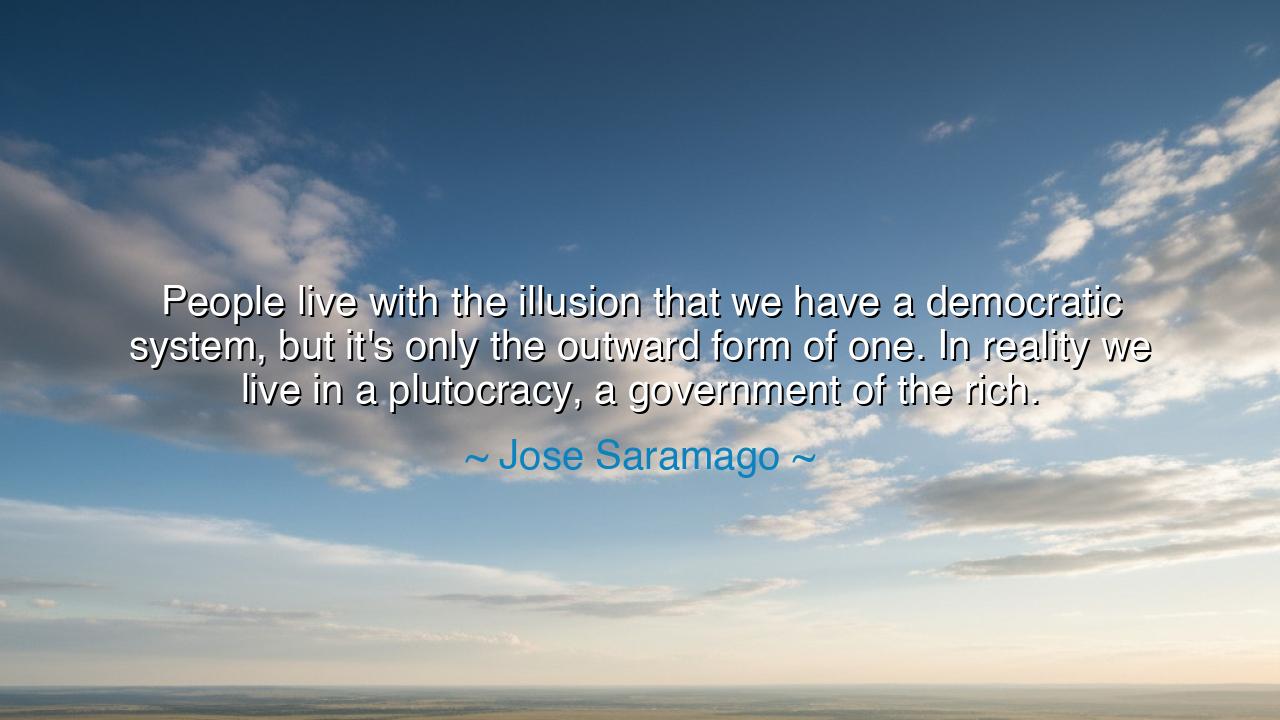
People live with the illusion that we have a democratic system
People live with the illusion that we have a democratic system, but it's only the outward form of one. In reality we live in a plutocracy, a government of the rich.






"People live with the illusion that we have a democratic system, but it's only the outward form of one. In reality we live in a plutocracy, a government of the rich." Thus spoke José Saramago, the Portuguese sage and Nobel laureate, whose pen cut through the illusions of the modern world with the clarity of an ancient prophet. In this saying, he tore the veil from one of the grandest pretenses of our age — the belief that Democracy reigns where Wealth rules. His words are not merely cynical; they are a lament and a warning. For when the people mistake appearance for truth, when they bow before symbols rather than substance, freedom itself becomes a masquerade, and the throne of power is quietly claimed by gold.
Saramago, born in poverty and raised amidst the tumult of 20th-century Portugal, lived through tyranny, revolution, and the hollow promises of reform. He saw with his own eyes how Governments, adorned with the language of liberty, could still serve the interests of a privileged few. His quote speaks not only to Portugal, but to all nations that wear the mask of Democracy while bowing to the will of the rich. He understood that in such systems, elections and speeches may remain, but true power — the power to decide the fate of nations — is concentrated in the hands of those who possess wealth enough to bend the rules to their favor. Thus, the people live in what he called an illusion, believing themselves sovereign while being silently ruled by money.
Throughout history, this truth has repeated itself in endless cycles. Consider the waning days of the Roman Republic, when senators spoke of liberty even as they sold their loyalties to the wealthiest patrons. Rome, like so many nations after it, became a plutocracy long before its emperors crowned themselves. The merchants and magnates bought influence, financed wars, and dictated policy while the plebeians cheered for illusions of power. Bread and circuses replaced justice and truth. The Republic’s fall was not merely political — it was moral. Its citizens forgot that freedom dies not only by tyranny, but by corruption disguised as democracy.
Saramago’s insight is not one of despair but of awakening. He does not tell us that democracy is false by nature — only that it decays when its people cease to guard it. The illusion he warns of is sustained not by force, but by complacency. When citizens trade vigilance for comfort, when they allow the few to purchase the voice of the many, then democracy becomes a theatre, and the actors are not the people but their masters. The ballot remains, but its power fades; the laws stand, but they serve only those who can afford their favor. The plutocrat rules not by decree, but by control of the invisible levers of wealth — the press, the market, the institutions of influence.
Yet in these words lies also a call to courage. For if illusion is the weapon of the powerful, truth is the defense of the free. Saramago, like the philosophers of old, believed that awareness is the first act of resistance. When a man opens his eyes to see the strings that move the puppets, he is already half-liberated. The people, once awakened, can reclaim what has been stolen from them — not through violence, but through unity, conscience, and the unbending demand for transparency. The democracy of the heart must precede the democracy of law, or both will crumble together.
We have seen glimpses of this awakening in our own time. When citizens rise to challenge corporate domination, when workers demand fair wages, when ordinary men and women question the marriage of money and power — these are the echoes of Saramago’s truth made flesh. From the farmers of India protesting economic chains, to the youth of America calling out inequality, the struggle continues across the centuries: the eternal war between those who hoard power and those who dare to share it. Every generation must choose whether to live in comfort within illusion, or in hardship for the sake of reality.
The lesson, then, is one of vigilance and virtue. Do not mistake freedom’s symbols for its substance. A nation cannot remain democratic merely because it holds elections; it remains so only when its people question, participate, and refuse to be bought. The government of the rich endures only when the poor and the ordinary surrender their courage. Therefore, live not as spectators but as guardians. Know the forces that shape your society; question who profits from your obedience and who loses by your silence. For the health of democracy lies not in wealth or spectacle, but in the integrity of its citizens.
So remember the wisdom of José Saramago: when money governs, justice becomes a servant and truth a beggar. But when the people awaken — when they cast aside illusion and reclaim their voice — the mask falls, and Democracy is reborn. Let each generation, therefore, guard the flame of freedom against the winds of wealth, lest the temple of liberty be gilded on the outside and hollow within.






AAdministratorAdministrator
Welcome, honored guests. Please leave a comment, we will respond soon